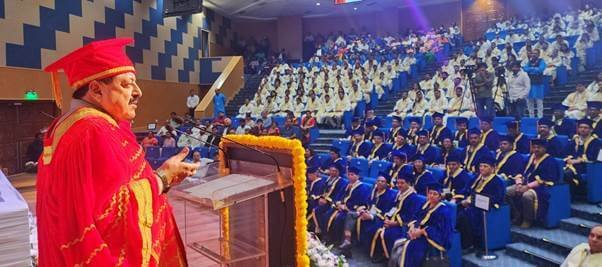The introduction of Industry-Linked i-PhD represents a transformative leap in doctoral education. By cultivating a new generation of science entrepreneurs armed with both academic knowledge and practical skills, India is poised to make significant strides in research and innovation. This initiative, coupled with international best practices, heralds a promising era where the synergy between academia and industry fuels groundbreaking discoveries and addresses real-world challenges.
In a groundbreaking move towards transforming traditional Ph.D. programs, the Union Minister of Science and Technology, Dr. Jitendra Singh, recently announced a paradigm shift with the introduction of Industry-Linked i-PhD – a visionary initiative aimed at producing not just educated individuals but science entrepreneurs ready to tackle real-world challenges.
As a recent doctoral graduate reflecting on the traditional Ph.D. journey, the realization struck hard – despite years of dedicated study and research, the disconnect between academic prowess and real-world applicability left many feeling ill-equipped for the job market. Driven by scholarships and the allure of a Ph.D. degree, the pursuit often veered away from practicality. The dilemma of being well-versed in academic theories but lacking the skills demanded by industries was a stark reality.
The Union Minister’s announcement marks a turning point. This pioneering approach seeks to bridge the gap between academia and industry, ensuring that research not only contributes to scientific knowledge but also aligns with the practical needs of the job market.
During the 7th Convocation of the Academy of Scientific and Innovative Research (AcSIR) in New Delhi, Dr. Jitendra Singh emphasized the need for a close association between academics and industry to nurture educated, employable science entrepreneurs. AcSIR, functioning on a ‘Hub and Spoke’ model, serves as a unique academic platform that awards degrees designed to be immediately employable, with a curriculum enriched by entrepreneurial nuances.
The essence of this transition from Ph.D. to i-PhD lies in reorienting research to produce graduates who not only possess scientific knowledge but also entrepreneurial acumen. The minister envisions a future where i-Ph.D. holders are not just employable but ready to take on entrepreneurial challenges, marking a departure from the past where doctoral candidates often found themselves lacking in practical skills relevant to the industry.
Drawing inspiration from international initiatives, the Australian Government’s “National Industry PhD Program” is a notable example. With an investment of $296 million, Australia plans to add 1300 i-PhD scholars over a decade. The program offers two streams – an Industry Linked Ph.D. stream for outstanding candidates to undertake research projects collaboratively designed by universities and industries, and an Industry Researcher Ph.D. stream catering to industry professionals pursuing Ph.D. projects while retaining employment and salary benefits.
In acknowledging this transformative leap in doctoral education, it is crucial to emphasize that traditional academic research remains highly esteemed. This shift to Industry-Linked i-PhD seeks not to diminish the value of pure academic inquiry but, instead, to bridge the gap between theoretical knowledge and practical application.
The Indian government’s move mirrors a global trend towards fostering collaborative research environments that prioritize industry relevance. By aligning academia with the needs of the job market, the initiative aims to tap into India’s vast research potential and bring it on par with its Western counterparts.

Credits: Press Information Bureau, New Delhi; Department of Education, Australian Government